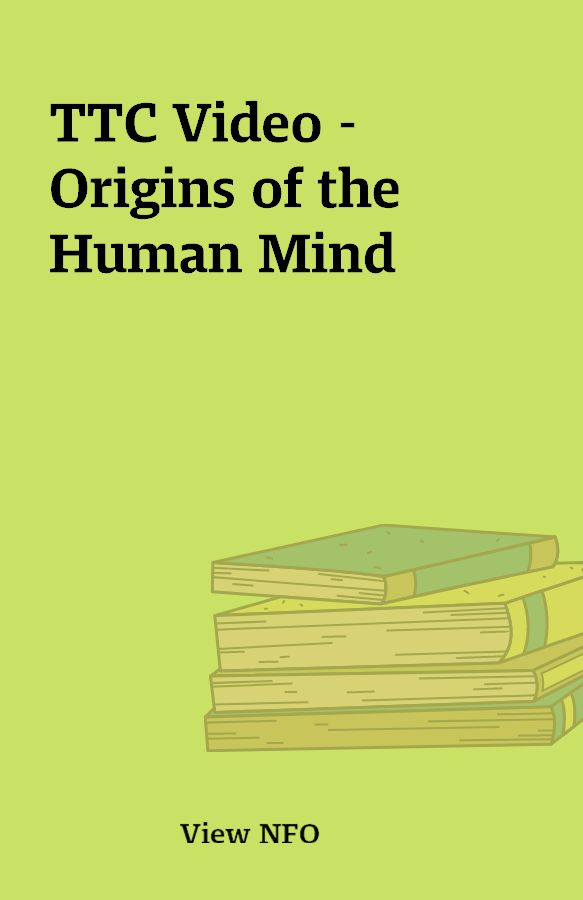TTC Video – Origins of the Human Mind
TTC_Vid_-_Origins_of_the_human_mind
[26 AVI, 1 PDF, 1 NFO]
Description
TTC Video – Origins of the Human Mind [26 AVI, 1 PDF, 1 NFO]Origins of the Human MindCourse No. 1663 (24 lectures, 30 minutes/lecture)Taught by Stephen P. HinshawUniversity of California, BerkeleyPh.D., University of California, Los AngelesFor thousands of years, the human mind has been shrouded in mystery. Elusive in nature, the subject has prompted an intensive study of several puzzling questions:* What exactly are our minds?* What are they made of?* How do they work?* How do they differ from our brains?* How do they develop?With the latest advancements in both our understanding of the brain and the technology we use to look inside it, scientists have vastly improved their understanding of the human mind. Now, more so than at any other point in human history, we can better explain and describe* how the human mind has evolved, both on the scale of our entire species from the dawn of humanity to the present, and on the individual level from birth to adulthood;* the ways our genes and environments work together to mold the people we become;* the sources, symptoms, and potential treatment methods for debilitating mental disorders such as depression, attention-deficit hyperactivity disorder, and autism;* why our intensely social species has the dynamic capability to both ostracize and empathize with the humanity of our fellow individuals; and much more.Despite its mysterious nature, the human mind and its complexities lie at the heart of who we are as human beings. It shapes our everyday lives and defines our individual personalities. And grasping both the mind’s scientific origins and its biological workings is essential to any well-rounded understanding of possible answers to questions that have fascinated and perplexed humanity throughout history.Origins of the Human Mind is your authoritative guide to the latest information and viewpoints on what neurobiologists, psychologists, and other scientists know about this fascinating subject. These 24 intriguing and enlightening lectures lay bare the inner workings of our minds—and it’s all brought to you by award-winning Professor Stephen P. Hinshaw, an instructor whose training as a clinical psychologist straddles both the science of the mind and its impact on individual lives. His comprehensive and unbiased approach to this subject reveals how the science of the human mind applies to the life of our species—and to your own life as well.Explore the Mind on Two Fascinating ScalesSo what, exactly, is the human mind? Our minds, according to Professor Hinshaw, are not disembodied entities completely separate from our brains. Rather, they are a rich, diverse, and utterly complex set of mental and emotional experiences that originate in our brains and interact with our surrounding environment.Grasping such a concept might seem like a daunting task, but Professor Hinshaw’s approach is methodical, organized, and compelling. The foundation of Origins of the Human Mind lies in its exploration of theories about how the mind works on two key scales, each of which offers its own fascinating insights into how and why our minds operate the way they do:* The evolutionary scale (phylogeny): This scale offers you a captivating window into how minds evolved over hundreds of millions of years and led to the development of brain plasticity, intense emotional bonds, complex executive functions, the potential for culture and invention, and more.* The individual scale (ontogeny): This scale shows you how changes made on an evolutionary level unfold throughout a single human lifespan, from infancy to adolescence to adulthood to advancing old age.Examining these scales in depth—and together—allows you to notice similarities and differences in viewpoints and approaches that you wouldn’t get from an intense focus on one or the other. It also demonstrates how viewing the development of the mind on a large and small scale simultaneously provides us with the best possible picture about what the mind truly is.Get Answers to Provocative Scientific QuestionsBut what makes Origins of the Human Mind so essential to your grasp of contemporary scientific issues are the answers that Professor Hinshaw provides to some of the most provocative questions involved in the study of the human mind:* What roles do the building blocks of the brain—such as neurons, synapses, and neurotransmitters—play in operating both the normal and abnormal human mind?* Is your mind genetically predisposed to act the way it does, or is it shaped by your environment and upbringing?* If mental disorders like depression and schizophrenia are so harmful, why haven’t the maladaptive genes that cause them been bred out through natural selection?* Why is there such a long period of helplessness required for full brain maturation, and why does the majority of brain development occur after birth?* How different, if at all, are the cognitive skills and behavioral patterns of men and women?Some of the conclusions reached by today’s scientists may simply confirm what you’ve always intuitively suspected. Others may challenge what you thought you knew about your mind. In all instances, however, these answers bring you closer than ever to scientific frontiers we’ve only recently discovered.Discover the Humanity behind the Science of the MindProfessor Hinshaw has made a career of studying the human mind from multiple points of view. Yet it’s his background in clinical psychology, his distinguished career as a scientist, and his position as Professor of Psychology at the University of California, Berkeley, that make him an invaluable guide through the often perplexing territory of the human mind.His ability to make clear sense of a range of scientific topics (including evolution, behavioral genetics, and neurobiology), combined with his ability to distill the humanity hidden within grand scientific theories and concepts, makes these lectures as compassionate as they are comprehensive. Whether discussing the development of emotions and instincts, comparing the 21st-century human brain to that of its primitive ancestor, or even relating his own family’s personal struggles with mental illness, Professor Hinshaw always avoids turning this course into a dry accumulation of facts and data devoid of personal meaning.Instead, he’s crafted Origins of the Human Mind to be a multifaceted look at one of the hottest subjects in the scientific world. And while more work needs to be done until we finally solve the riddles of our minds, by the conclusion of the last lecture you’ll find yourself better prepared to understand the discoveries of tomorrow as they arise.About Your ProfessorDr. Stephen P. Hinshaw is Professor of Psychology at the University of California, Berkeley, where his teaching was honored with the Distinguished Teaching Award from the College of Letters and Sciences. He received his A.B. from Harvard University and his Ph.D. in Clinical Psychology from the University of California, Los Angeles.Before joining the faculty at Berkeley in 1990, Professor Hinshaw was a clinical psychology intern at UCLA’s Neuropsychiatric Institute, a post-doctoral fellow at the Langley Porter Psychiatric Institute of the University of California, San Francisco (where he received the Robert E. Harris Award), and a professor at UCLA.A fellow of the Association for Psychological Science and the American Psychological Association, Professor Hinshaw focuses on developmental psychopathology, with particular emphases on child and adolescent disorders. He is the editor of Psychological Bulletin, the most cited journal in the entire field of psychology, and associate editor of the journal Development and Psychopathology; he has also written more than 200 scholarly articles, chapters, and reviews. Among his many books are Attention Deficits and Hyperactivity in Children and The Years of Silence Are Past: My Father’s Life with Bipolar Disorder. Professor Hinshaw has received millions of dollars in research grants from federal agencies, including the National Institute of Mental Health.Course Lecture Titles01. Brains and Minds, Evolution and Development02. How the Human Brain Works03. Development of the Human Brain04. Evolution and the Brain05. Psychological Views of the Mind06. Instinct, Learning, and Emotion07. Microevolution, Culture, and the Brain08. Infancy—Temperament and Attachment09. Childhood—Stages and Widening Contexts10. Adolescence—Rebellion, Identity, and Self11. Adulthood—Aging, Horizons, and Wisdom12. Influences of Sex and Gender13. Parallels between Development and Evolution14. Myths and Realities of Heritability15. Genes and Environments Together16. The Abnormal Mind—What Goes Wrong?17. Rationality, Psychosis, and Schizophrenia18. Emotion Regulation and Mood Disorders19. Attention, Impulse Control, and ADHD20. Empathy, Social Connections, and Autism21. Evolution and the Paradox of Mental Illness22. Roots of Religion, Aggression, and Prejudice23. Bringing in Personal Narratives24. The Future of the Human Mind
You must be logged in to post a review.






Reviews
There are no reviews yet.